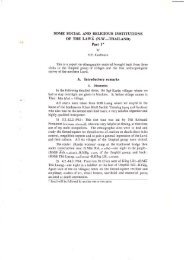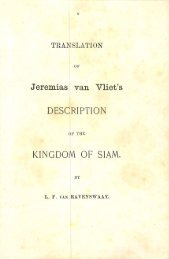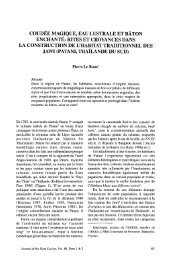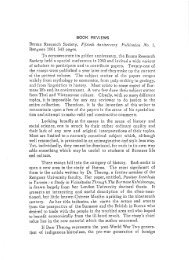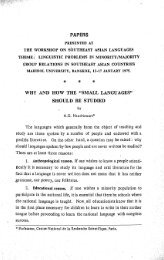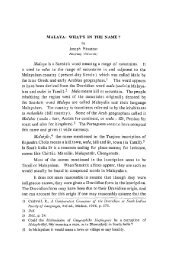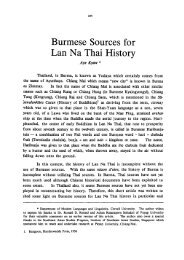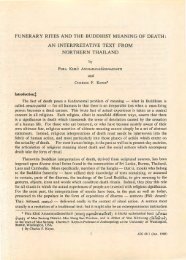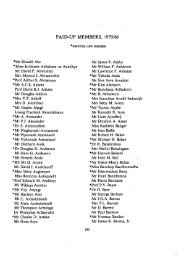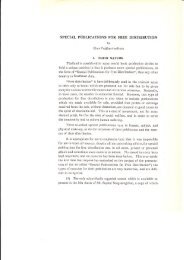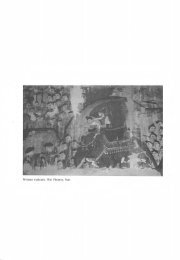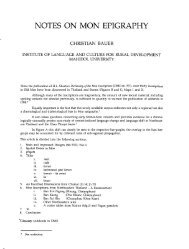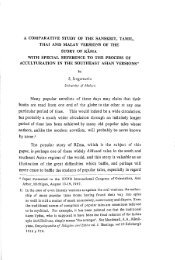REVKJEWS - Siamese Heritage Protection Program
REVKJEWS - Siamese Heritage Protection Program
REVKJEWS - Siamese Heritage Protection Program
Create successful ePaper yourself
Turn your PDF publications into a flip-book with our unique Google optimized e-Paper software.
REVIEWS 141<br />
Chapter III Course of Events-A brief description of political events and changes<br />
in Thailand from the 1932 Revolution to the present time is presented here.<br />
Chapter IV Political structure-This chapter analyzes the dynamic relationship<br />
between the military leadership and bureaucratic structure, as well as the emergence<br />
of "extrabureaucratic" elements in Thai society, such as political parties, professional<br />
associations, academics, and labor groups, etc.<br />
Chapter V Political Performance-This chapter focuses the analysis on the<br />
October 1973 events and the democratic interregnum between 1974-1976. The reactions<br />
after the 1976 coup d'etat is also analyzed.<br />
Chapter VI External Involvement-This chapter analyzes Thai foreign relations<br />
with respect to the Super powers, and the neighbouring ASEAN as well as Indochinese<br />
countries.<br />
Chapter VII Revolutionary Alternative-This chapter traces the evolution and<br />
expansion of the communist movement in Thailand. The recent dilemma facing the<br />
Communist Party of Thailand is also discussed.<br />
Professor Girling's Thailand, Society and Politics is well-organized and well<br />
written and also quite comprehensive in the coverage. The main theme of the book<br />
seems to be based on his earlier work on "Conflict or Consensus?" Thai history is<br />
seen here as having been "fashioned around consensus, based on traditional Thai values,<br />
patterns of behavior, and institutions-in some aspects adapting to, and in others resisting,<br />
the impact of change." (p. II) Such a consensus does not mean simply mutual<br />
cooperation. In fact, clique rivalries among the leaders, such as those between Phao<br />
and Sarit, are parts of the rules of the game or rather understandings, which form the<br />
basis of the traditional Thai consensus.<br />
Professor Girling also points out that this consensus is expressed through personality,<br />
patronage, customary values, and the embodiment of all three-the bureaucracy,<br />
where the relations between superior and subordinate, or '·patron-client" are the natural<br />
form of interaction. These personal, reciprocal relationships cut across the "formal"<br />
organizational structure of the modern centralized bureaucracy. Thai political system<br />
as such "receives the symbolic support of the monarchy and the Buddhist hierarchy."<br />
(p. 12).<br />
This is the political order that only in the past two decades has been substantially<br />
affected by the modernization and economic development. Professor Girling<br />
correctly observes (p. 101) that "modernization in Thailand has taken the form of<br />
uneven rural development, on the one hand, and business-bureaucratic partnership, on<br />
the other, both within an international orbit of powerful strategic and market<br />
forces." These forces create newly "aware" groups and movements, in this book<br />
called "extrabureaucratic" elements, that no longer fit the traditional political system.



